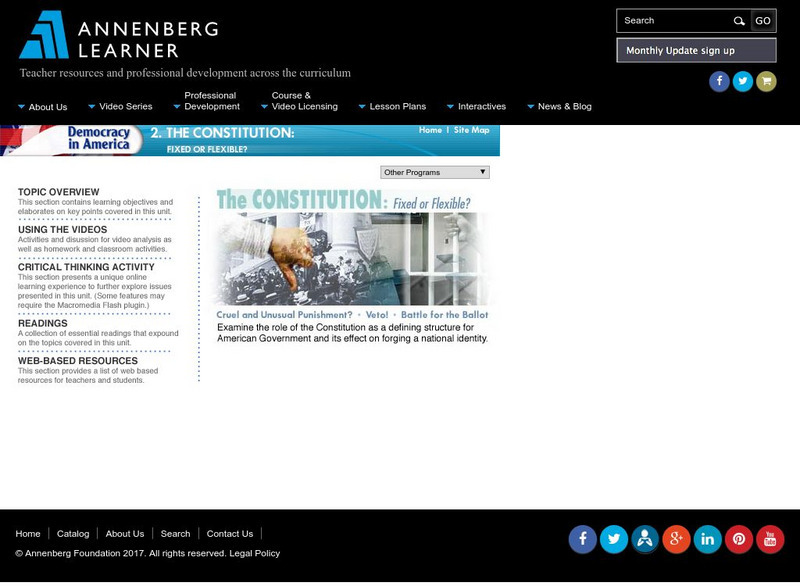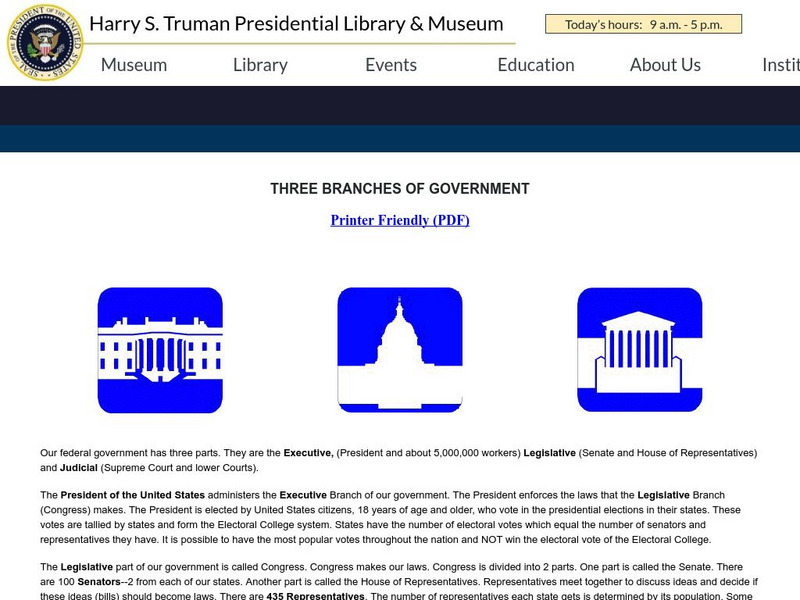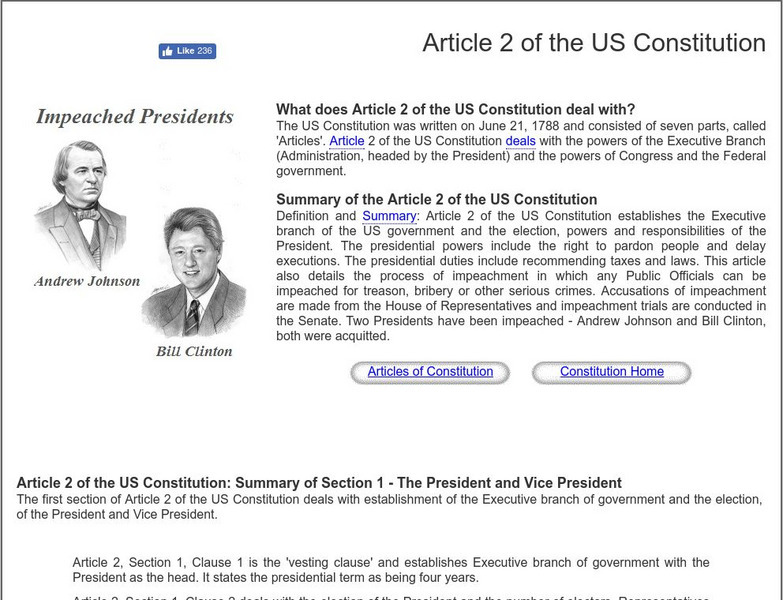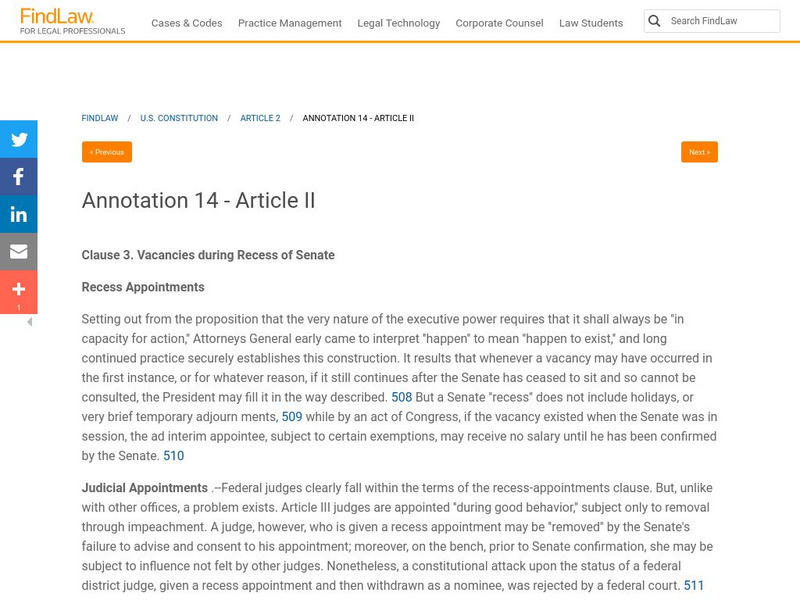Hi, what do you want to do?
Khan Academy
Khan Academy: Japanese Internment
Discusses the internment of Japanese Americans during World War II, an action that resulted from Franklin D. Roosevelt's Executive Order 9066. The constitutionality of the order was challenged all the way to the Supreme Court by Fred...
Annenberg Foundation
Annenberg Learner: Democracy in America: The Constitution: Fixed or Flexible?
This unit explores the timeless qualities of The U.S. Constitution, the opportunities to amend it, and how it is a pillar of the American identity, through these activities, videos, and outside resources.
US Department of State
Office of the Historian: Constitutional Convention and Ratification
Among the many weaknesses of the Articles of Confederation was the inability of the government to conduct foreign policy in an effective manner. Find out how the Constitutional Convention addressed this issue by allowing the Executive...
US Government Publishing Office
Ben's Guide to u.s. Government: The President of the United States (9 12)
Summarizes the role of the President as the Head of the Executive Branch and the powers and duties assigned to him by the Constitution. Provides links to further information.
US Government Publishing Office
Ben's Guide to u.s. Government: Learning Adventures: Branches of Government
Introduction to a learning adventure on the Constitution and branches of government. Students click on their age group icon to find information on which part of the Constitution spells out the powers of legislative, executive and...
US Government Publishing Office
Ben's Guide to u.s. Government: The President of the United States (3 5)
Describes the job and duties of the President of the United States as head of the executive branch. Also discusses how the President is elected and the length of terms of office.
Other
The American Interest: China's Place in u.s. Foreign Policy
China's remarkable aggregation of national power over the past 35 years has been a source of wonderment: to economists, who have been surprised by that country's consistently high rate of growth; to political scientists, who are at a...
Harry S. Truman Library and Museum
Harry S. Truman Library & Museum: Checks and Balances
Descriptions of the separate powers and functions of the three branches of the federal government. Site explains how the powers of one branch check and balance those of another.
Harry S. Truman Library and Museum
Harry S. Truman Library & Museum: Three Branches of Our Government
This slide and the six that follow it (use the advance button near the bottom of the screen) offer an explanation of each of the three branches of government and the duties they perform, including discussion of the tensions arising from...
Other
Usa Gov: Three Branches of Government
Lesson plans for students to learn about the three branches of government. They can find information about the origins of the Constitution, separation of powers, and details about each of the three branches.
US Government Publishing Office
Ben's Guide to u.s. Government: Branches of Government
A brief overview of the origins of the three branches of the federal government, with links to more in-depth information about each branch. Also discusses the concerns of the Founding Fathers about creating a government that had...
iCivics
I Civics: Six Roles of the President (Infographic)
Infographic helps keep track of the many hats worn by the president.
US National Archives
Nara: Teaching With Documents: Lincoln's Spot Resolutions
This "Teaching with Documents" lesson on Lincoln's spot resolutions explores the Mexican War, Lincoln's questioning of the propriety of the war, and the power of the U.S. President at that time. Content includes extensive historical...
Siteseen
Siteseen: Government and Constitution: Article 2 of the Us Constitution
Article 2 of the US Constitution deals with the establishment of the Executive Branch, the election of the President and Vice-President, the powers and responsibilities of the President, and the process of impeachment.
US Government Publishing Office
Ben's Guide to u.s. Government: Games
Test your knowledge of U.S. geography and government with these games and printable activities. In one game, see if you can place all 50 states in their correct location. In the second game, see if you can recognize the powers of each...
US National Archives
Nara: Teaching With Documents: Sioux Treaty of 1868
The National Archives and Records Administration highlights the Sioux Treaty of 1868. The lesson provided here relates to the power granted to the president and the Senate in Article II, Section 2, Clause 2, of the U.S. Constitution, the...
Shmoop University
Shmoop: Making the Constitution Terms
Read about Checks and Balances, Balance of Power, the Electoral College, and much more in this informative lesson about the making of the Constitution.
US National Archives
Nara: Teaching With Documents: The Lewis and Clark Expedition
The National Archives and Records Administration (NARA) presents the Lewis and Clark Expedition as a Constitutional issue. The instructional activity provided relates to the power granted to the President and the Senate to make treaties...
US Government Publishing Office
Ben's Guide to u.s. Government: Judicial Branch (9 12)
Provides a brief overview of the judicial branch of the federal government. Discusses the origin of the judicial branch, the concept of judicial review, and functions of the judicial branch. Links to more information about the U.S....
Tour Costa Rica
Costa Rica Government: Overview
This site gives an overview on the government of Costa Rica. Includes information on the courts, executive and legislative powers, and the provinces of Costa Rica.
Khan Academy
Khan Academy: Fdr and World War Ii
Discusses how Franklin D. Roosevelt guided the United States through World War II and laid the groundwork for Harry Truman to assume the role after his death.
Thomson Reuters
Find Law: Article Ii: Recess Appointments
Explains Clause 3 of Article II, Vacancies during Recess of Senate. It outlines various situations where a vacancy may occur and what rules are in place to deal with it.
Other
President Gerald Ford's Veto of Railroad Retirement
Text of the message that President Ford wrote to the House of Representatives in 1974 stating his reasons for his veto of the Railroad Retirement Benefits Legislation.
Indiana University
Center on Congress: Learn About Congress
Learn about the role of the US Congress, how it works, its history, and the principles behind its creation and operation. Wonderful set of resources including FAQs, short articles and video clips, "interactive learning modules" (i.e., a...














